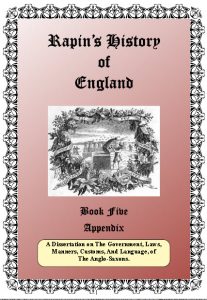A DISSERTATION
ON THE
GOVERNMENT, LAWS, MANNERS, CUSTOMS, AND LANGUAGE, OF THE ANGLO-SAXONS.
THE revolution which happened in Europe, about the beginning of the fifth century, is one of the most remarkable events in history. The Roman empire, which was almost of equal extent with the known world, was then divided into two empires, one containing the eastern, the other the western provinces.
The western empire was so harassed by the continual invasions of the northern nations, that loosing by degrees all its provinces, it was reduced to nothing, and the very name of emperor of the west, vanished with that empire. This great revolution quite altered the state of Europe, by introducing new inhabitants, who, raising new kingdoms upon the ruins of the Roman Empire, brought at the same time new laws and customs into the conquered countries.
Spain was peopled with colonies of Visigoths, Catti, Alani, and Suevi. Gallia was overwhelmed with a deluge of Visigoths, Burgundians, and Francs. Italy was so exposed to the successive invasions of the Heruli, Ostrogoths, and Lombards, that the ancient inhabitants, instead of preserving the superiority of number, made no figure at all. The Saxons, Suevi, and Bavarians, spread themselves over all Germany, and became masters over that vast tract of land. In a word, Great-Britain was so over-run with Saxons, Angles, and Jutes, that hardly could any remains of the ancient Britons be discovered. It was very natural for these conquerors to establish in their new erected kingdoms their own country customs. And therefore it may be advanced for certain, that the laws now in force, throughout the greatest part of Europe, are derived from the laws these ancient conquerors brought with them from the north.
In the second book of this history we have seen that the Saxons were no sooner arrived in Great Britain than they formed a design of settling there, and at length succeeded after a war of 150 years. This long war bred such enmity between them and the Britons, that there is no probability the Saxons, who in the end proved victorious, should borrow from the vanquished the form of government, established in their conquests. If therefore we would trace the origin of the laws and customs of the Anglo-Saxons, we must search for it in Germany and the other northern countries, rather than among the ancient Britons. And indeed, such is the resemblance between the laws of the Saxons, Francs, Suevi, Lombards, and the other northern nations, that it must necessarily be concluded, they had all the same origin, of an older date than the separation of these people.
